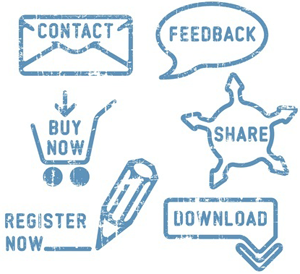- May 12, 2014
- By Cleriti Blogger
- In Marketing Strategy and Planning, Website Design and SEO



We're always thinking, discovering and sharing our knowledge of how to connect with customers in the digital age. Here we share some of those thoughts.

Inbound lead generation is what makes today's digital marketing world go around. Without a system set up to get leads, you have no chance of expanding your company’s customer base. And you can't generate inbound leads unless you make a point to encourage website visitors to take the next step. Without specific calls to action, your marketing efforts will remain stuck in neutral, with no chance of reaching their potential.
 Calls to Action
Calls to ActionWhat’s a call to action? It’s anything that motivates the recipient of your message to move from passive to active. It’s a query that gets people moving in the direction of becoming a customer, even if the actual motion is just clicking a “Like” button or filling out a form. The actual call to action can vary in its significance, but your ultimate goal is always to convert as many customers as possible.
A call to action doesn’t have to be a plea to actually patronize your product or service. The call to action can be asking people to sign up for your email list or coupons. In either case, once the customer follows through on their end of the bargain, you’ve got a quality lead that you can use to pitch future offerings.
Calls to action should not be confused with conventional marketing, which can often be like throwing concepts at the wall and seeing what sticks, without any regard for what a prospect might want or need. There’s no motivation for someone to click a banner ad. Inbound lead generation is all about providing legitimate incentive for people to start building a relationship with your company. In order to get people to do that, you’ll have to give them something of actual value.
What should you give? The possibilities are limitless. You can give a white paper about a topic of particular interest, exclusive email content and promotions, or access to podcasts or video files. The main thing to remember is that it has to satisfy a need for the customer. If your call to action is accompanied by a subpar incentive, nobody is filling out your website form.
As you create your calls to action and the rewards for compliance, think about what you’d like to see if you were a customer. What approaches would you like to see? What form of participation would be the most likely to get you to respond? What type of tangible goods would you like to see for completing the request? If you can successfully answer these questions, you’ll likely have great success with your calls to action.
That said, you’ll still want to test your approaches. A call to action is great, but it should be refined over time. There are many ways in which a pitch can fall flat. Try different calls to action and see which ones work best for your organization. And don’t be afraid to make changes. Even something as small as a change to your form's “Submit” button can be the difference between leads and indifference.
It’s not good enough to merely assume that customers will patronize your company if they’re impressed with your website. You have to ask for their business, and you have to earn it by delivering the goods before you receive a dime. Calls to action are the most important part of inbound lead generation, and the more time you spend refining your pitches, the more leads you’ll get.
We know what it takes to create meaningful connections with customers.
Subscribe to our newsletter and start thinking with Cleriti.

